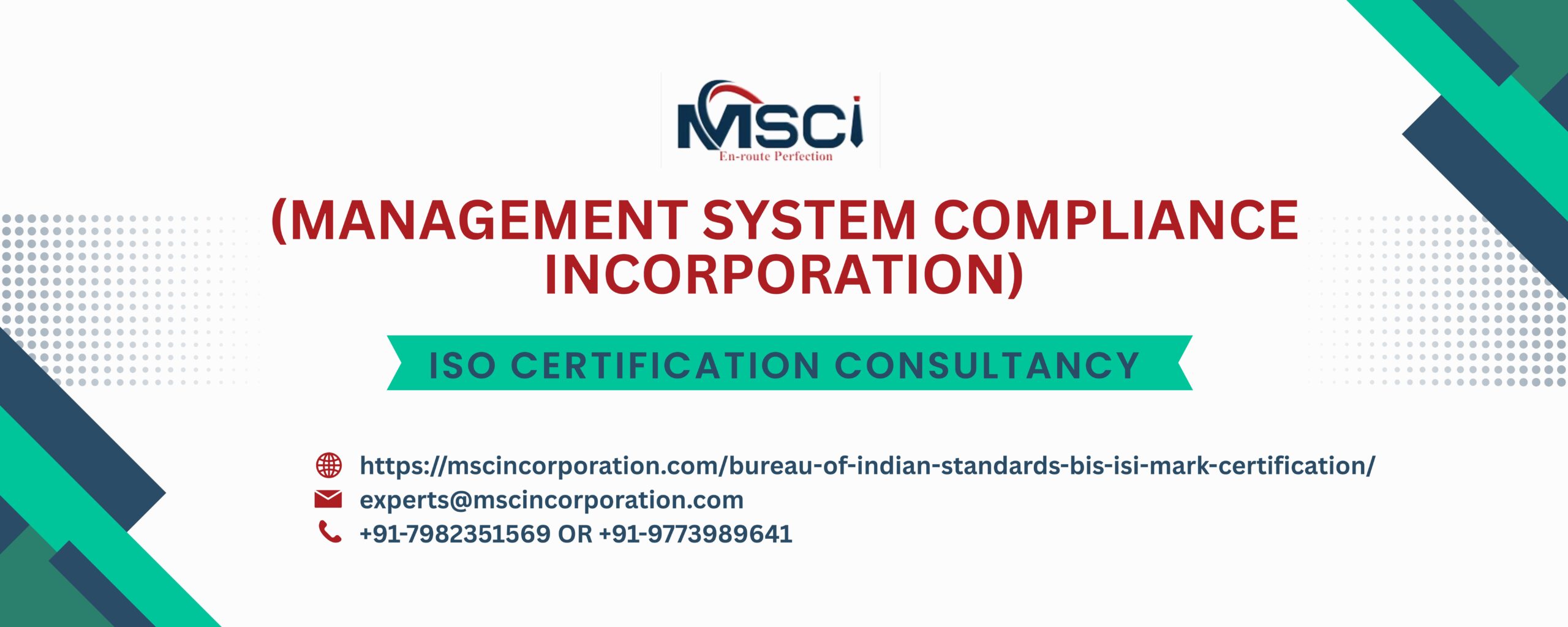What is BIS Certification?
The Bureau of Indian Standards (BIS), established under the BIS Act, 2016, is India’s national standards body, succeeding the Indian Standards Institution (ISI) founded in 1947. BIS sets Indian Standards (IS) to ensure product quality, safety, and reliability across industries. BIS certification confirms compliance with these standards, marked by the ISI Mark for industrial and consumer goods or the CRS (Compulsory Registration Scheme) mark for electronics and IT products. While voluntary for many products, certification is mandatory for items under Quality Control Orders (QCOs) to ensure consumer safety, environmental protection, and fair trade. BIS certification enhances market credibility and is essential for legal market access in India.
The Importance of BIS Certification Consultancy Services
Navigating the BIS certification process can be complex, involving detailed documentation, product testing, factory audits, and compliance with Indian Standards. BIS certification consultancy services simplify this journey, offering expert guidance to manufacturers, especially those unfamiliar with Indian regulations or operating internationally. Key benefits include:
- Regulatory Expertise: Consultants identify applicable standards and QCOs, ensuring compliance.
- Accurate Documentation: They streamline application preparation, reducing errors and rejections.
- Testing and Audit Support: Consultants coordinate lab testing and prepare manufacturers for BIS inspections.
- Time and Cost Efficiency: Professional guidance minimizes delays and additional costs like re-testing.
- Global Support: For foreign manufacturers, consultants facilitate compliance through Authorized Indian Representatives (AIR). Without consultancy, manufacturers risk delays, penalties, or market entry barriers, making these services essential for efficient certification.
BIS Certification Consultancy Services for Indian Manufacturers
Indian manufacturers benefit from tailored consultancy services for Scheme-I (ISI Mark) or Scheme-II (CRS) certification. These services ensure compliance with BIS standards and QCOs, enabling seamless market access. Key offerings include:
- Process Streamlining: Assessing production and quality control systems to meet BIS requirements.
- Audit Preparation: Guiding manufacturers through BIS factory inspections.
- Testing Coordination: Managing product testing at BIS-approved labs to meet Indian Standard Specifications (ISS).
- Fast-Track Options: Leveraging simplified procedures (e.g., Option 2) or the Tatkal Scheme for expedited licensing. Consultancy services help Indian manufacturers secure the ISI Mark, enhancing product credibility and market competitiveness.
What are Quality Control Orders (QCOs)?
Quality Control Orders (QCOs), issued under Section 16 of the BIS Act, 2016, mandate BIS certification for specific products to protect public health, safety, the environment, and fair trade. Products under QCOs require a BIS license or Certificate of Conformity (CoC) to bear the ISI or CRS Mark. Non-compliance can result in fines (starting at ₹2 lakh), imprisonment (up to two years), product seizures, or market bans. QCOs are issued by ministries like MeitY or DPIIT, and manufacturers must stay updated on the evolving list of covered products.
Who Needs BIS Certification in India?
BIS certification is mandatory for:
- Manufacturers: Indian and foreign producers of QCO-covered products, such as electronics or toys.
- Importers: Those importing mandatory products must ensure BIS compliance before market entry.
- Distributors/Retailers: They must sell products bearing the BIS Standard Mark if required by QCOs. Voluntary certification is pursued by manufacturers of non-mandatory products to boost market trust and meet procurement needs, leveraging the ISI Mark’s reputation for quality.
Which Products Require BIS Certification?
Over 380 products require mandatory BIS certification under QCOs as of 2025, including:
- Electronics and IT: Smartphones, laptops, LED lights, power banks (CRS, Scheme-II).
- Electrical Appliances: Cables, switches, water heaters, electric irons.
- Industrial Materials: Cement, steel, aluminum foils, polyethylene products.
- Consumer Goods: Toys, helmets, pressure cookers, safety footwear.
- Medical Devices: Syringes, catheters, diagnostic equipment.
- Jewelry: Gold and silver under hallmarking schemes. Manufacturers should verify the latest QCO list on the BIS website, as regulations frequently evolve.
Who Can Apply for BIS Certification?
Eligible applicants include:
- Indian Manufacturers: Producers with facilities in India, applying under Scheme-I or Scheme-II.
- Foreign Manufacturers: Overseas producers under the Foreign Manufacturers Certification Scheme (FMCS), requiring an AIR.
- Importers: Those importing QCO-covered products. Applicants must maintain adequate manufacturing and testing facilities, comply with ISS, and pay fees, including licensing and marking costs.
How MSCi Simplifies Your BIS Certification Journey?
MSCi, a trusted BIS certification consultancy, offers end-to-end support to streamline the certification process. Services include:
- Regulatory Guidance: Identifying applicable standards and QCOs for compliance.
- Documentation Support: Preparing and submitting accurate applications (e.g., Form V for Scheme-I, Form II for CRS).
- Testing Coordination: Arranging product testing at BIS-approved labs, ensuring valid test reports (up to 90 days for simplified procedures).
- Audit Preparation: Conducting pre-audits to ensure readiness for BIS factory inspections.
- AIR Facilitation: Acting as or connecting foreign manufacturers with an AIR for FMCS compliance.
- Efficient Timelines: Achieving certification in 60–90 days for domestic manufacturers or 5–6 months for FMCS.
- Ongoing Support: Assisting with license renewals (valid for 2 years, renewable up to 5 years) and regulatory updates. MSCi’s expertise ensures a smooth, cost-effective certification process, minimizing delays and errors.
How Can Manufacturers Get the ISI Mark?
The ISI Mark, a quality symbol under Scheme-I, is obtained through:
- Standard Identification: Confirm the relevant Indian Standard (IS) using BIS resources or consultancy support.
- Application Submission: Submit Form V online with documents like production details and quality control plans.
- Factory Audit: BIS inspects facilities to verify infrastructure and testing capabilities.
- Product Testing: Submit samples to BIS-approved labs for ISS-compliant test reports.
- Fee Payment: Pay application, audit, license, and marking fees (foreign manufacturers provide a $10,000 Performance Bank Guarantee).
- License Issuance: Upon compliance, BIS grants the ISIMark, allowing use of the ISI Mark. The process takes 60–90 days for domestic manufacturers and 5–6 months for FMCS. MSCi streamlines this process, ensuring compliance and efficiency.
List of Manufacturers That Can Apply for ISI Mark
Eligible manufacturers for the ISI Mark under Scheme-I include:
- Indian Manufacturers: Producers of cement, steel, toys, helmets, electrical appliances, or food products.
- Foreign Manufacturers: Overseas producers of QCO-covered products (e.g., chemicals, medical devices) via FMCS with an AIR.
- ECO Mark Applicants: Manufacturers of eco-friendly products seeking the ECO Mark alongside the ISI Mark.
- Specialized Producers: Those making niche products like safety glass or wheel rims under QCOs. Applicants must maintain robust testing facilities and quality control systems to meet ISS.
Why Choose MSCi?
MSCi stands out as a premier BIS certification consultancy due to:
- Expertise: In-depth knowledge of Scheme-I and Scheme-II processes for diverse industries.
- Comprehensive Services: End-to-end support, from application to post-certification compliance.
- Customized Approach: Tailored solutions for small-scale and multinational manufacturers.
- Regulatory Updates: Proactive monitoring of QCOs and BIS standards for ongoing compliance.
- Proven Success: A strong track record of securing certifications efficiently. MSCi ensures faster certification, cost savings, and market success for its clients.
Conclusion
BIS certification is vital for manufacturers targeting India’s market, ensuring quality, safety, and compliance with QCOs. The ISI and CRS Marks enhance consumer trust and enable legal market access. MSCi’s expert consultancy services simplify the complex certification process, offering regulatory guidance, documentation support, testing coordination, and audit preparation. By partnering with MSCi, manufacturers can efficiently secure BIS certification, display trusted quality marks, and excel in India’s competitive market.


